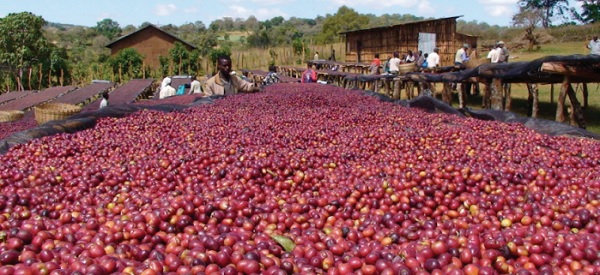
Enter Fairtrade
Ronald Buwuule is the man behind Kasule and Kyamulabi’s changed fortunes. He is the one who first heard of Fairtrade International, was impressed by its mission of fairness, and contacted officials at its headquarters in Bonn, Germany.
He says as a coffee farmer since 2000, he was unhappy that middlemen were cheating farmers and offering very low prices and founded a group called Nsangi Coffee Farmers Association to fight for better terms. The group’s name reflected its membership; mainly from Nsangi sub-county of Wakiso District. It changed name to CECOFA when members from Masaka and Mubende districts joined.
Buwuule’s 30-acre coffee plantation in the nearby Negambidde village about 5km off the Kampala Masaka in the same Wakiso district is the epitome of Fairtrade in practice.
Its coffee is abundantly inter-planted with different species of trees and several workers, mainly women, pick berries and weed. The men mainly prune the coffee trees. Buwuule employs about 10 workers every day to mainly weed because, he says, he uses herbicides sparingly. He explains that as part of a soil science course he took in Peru, which has similar soils like Uganda and grows coffee, he learnt that overuse of pesticides kill useful microorganisms in the soil. He also rears 20,000 layer chickens for income and the chicken droppings he uses as fertilisers.
Fairtrade International sent officials to this farm in 2014. Although they listed several stringent conditions that farmers must meet to be allowed membership, Buwuule was met them all.
The conditions included requiring every farmer to show proof of fairness in the way they pay labourers, conserve the environment by interplanting their coffee with trees, and give back to the community from the profits they get. Others requirements include not using prisoners or underage children as labour on their farms. Audited accounts and other evidence are required in all cases.
Buwuule explains that they prefer to admit farmers who have a minimum of an acre of coffee and anyone with big chunks of land who has potential and interest to grow coffee. Members pay a nominal subscription fee (equivalent to the price of 2kgs of processed coffee) per annum.
“If someone has land and does not have the capital to invest in coffee growing we can extend credit facilities to them under an agreement for them to pay back in installments,” Buwuule says.
The elderly who can no longer care for their coffee trees are assisted with labour and the cost is deducted from the sale proceeds.
After a farmer has been certified, CECOFA supervises the farmers to make sure they abide by the conditions and whoever fails to comply is dropped from this preferential arrangement.
Buwuule is today the Chief Executive Officer of CECOFA. He is also the Director for Youth in the National Union of Coffee Agribusiness and Farming Enterprises (NUCAFE), an umbrella organisation of coffee farmers in the country.
CECOFA now has 3,162 member farmers, 1,200 of whom have been certified under Fairtrade. They export through the association to companies in Switzerland, Italy, and Belgium. Buwuule says Germany will join that cohort soon. The companies include Sucafina of Geneva Switzerland, Café River of Italy, and 32 Cups of Belgium.
Buwuule explains that unlike conventional sales of coffee, the price under Fairtrade does not fluctuate wildly and is always above market price. At the time of writing this article, the Fairtrade companies were buying at US$2,450 per metric ton when the conventional price was US$2,000 per metric ton. At the time, the association was buying processed coffee at Shs6,300 per kg instead of the going market price of between Shs5,900-6,000 or less. Fairtrade buys only processed coffee.
“It’s the difference of the US$450 we get from the export of one container that we are able to run the association, do the supervision and also give back to the community. For the farmers they are also able to use the difference of 300shs or more from their kg of coffee to pay their workers fairly and maintain their coffee garden,” Buwuule explains.
The association has used some of the proceeds from the sale of coffee to purchase land and set up their own coffee huller and offices in Bulwanyi village.
Other associations in other parts of Uganda that have been granted an coffee export license under Fairtrade include Gumutindo and Coffee A Cup which operate in the Bugisu area of eastern Uganda. They export Arabica Coffee while CECOFA exports Robusta.
 The Independent Uganda: You get the Truth we Pay the Price
The Independent Uganda: You get the Truth we Pay the Price






Having worked for a year now at Central coffee Farmers Association (CECOFA) as a Social and sustainability Manager, i find there is a tremendous change in as far as farmers livelihoods is concerned. Socially, the farmers in Mubende and Luweero districts are testifying the projects undergoing implementation with funding from premium funds got from Fair trade.
One challenge am noticing is the delay in funding from the social lenders. This delay has led farmers do what is commonly called “side selling” to middle men to meet their pressing demands. Probably there is need to have more than one lender to mitigate this crisis but so far the trend is promising.
Thanks also go to the Fair trade Uganda Network and particularly Justine Namayanja for her continued support in empowering the producer organizations in capacity building and organizing seminars geared towards developing these Pos